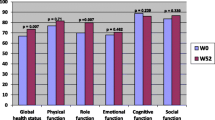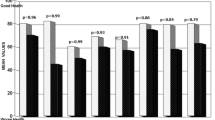Abstract
Colorectal cancer can be a painful event, generally associated with changes in lifestyle for many patients. We studied the quality of life of the patients operated for colorectal malignancies 5 years after the diagnosis. Using detailed questionnaires, we investigated 220 patients of both sexes (mean age 66.5 years) 5 years (or more) after a curative operation for cancer of the large bowel. The short form 36 (SF-36) questionnaire took into consideration several aspects concerning work activity, physical activity, psychological attitude, alimentation, familial relationships, and other relevant components of lifestyle. Moreover, we compared the perception of the so-called SF-36 score between our patients and a comparison group in the general population. Both univariate and multivariate analysis were used. The obtained results revealed that familial and social relations were equally unchanged or tended to improve. Sexual activity declined in only 61(31.3%) subjects. Rather surprisingly (because of the average age at diagnosis), work activity remained unchanged in about half of the patients. Using the SF-36 questionnaire, the main differences from the general Italian population were seen in bodily pain (especially in the few individuals in whom a permanent stoma was necessary), social functioning and general physical health. In conclusion the results seem to suggest that the majority of patients who survive for more than 5 years after an operation for colorectal malignancy return to an almost normal life. The awareness among individuals about their disease, the improvements in surgical techniques and medical treatments are among the factors responsible for these positive results.



Similar content being viewed by others
References
Eustace K (2005) Colorectal cancer. Lancet 365(8):83–166
Airtum Working Group (2006) Cancer trend (1998–2005) Epidemiologia e Prevenzione, Suppl.2 pages 1–147
Parkin DM, Olsen AH, Sasieni P (2009) The potential for prevention of colorectal cancer in the UK. Eur J Cancer Prev 18:179–190
Movsas B (2003) Quality of life in oncology trials: a clinical guide. Semin Radiat Oncol 13:235–247
Brown P, Clark MM, Atherton P, Huschka M, Sloan JA, Gamble G, Girardi J, Frost MH, Piderman K, Rummans TA (2006) Will improvement in quality of life (QOL) impact fatigue in patients receiving radiation therapy for advanced cancer? Am J Clin Oncol 29:52–58
Hennessy EM, Stevinson C, Fox KR (2005) Preliminary study of the lived experience of exercise for cancer survivors. Eur J Oncol Nurs 9(2):155–166
Rogers SN (2010) Quality of life perspectives in patients with oral cancer. Oral Oncol 46(6):445–447
Akin S, Can G, Aydiner A, Ozdilli K, Durna Z (2010) Quality of life, symptom experience and distress of lung cancer patients undergoing chemotherapy. Eur J Oncol Nurs 14(5):400–409
Mastracci TM, Hendren S, O’Connor B, McLeod RS (2006) The impact of surgery for colorectal cancer on quality of life and functional status in the elderly. Dis Colon Rectum 49(12):1878–1884
Eriksson E, Arve S, Lauri S (2006) Informational and emotional support received by relatives before and after the cancer patient’s death. Eur J Oncol Nurs 10(1):48–58
Ballatori E, Porzio G, Roila F, Ruggeri B, Mattei A, Cortesi E (2007) Is there still a role for the uniscale assessment of quality of life? Tumori 93(1):78–81
Tsunoda A, Nakao K, Hiratsuka K, Tsunoda Y, Kusano M (2007) Prospective analysis of quality of life in the first year after colorectal cancer surgery. Acta Oncol 46(1):77–82
Brazier JE, Harper R, Jones NM, O’Cathain A, Thomas KJ, Usherwood T, Westlake L (1992) Validating the SF–36 health survey questionnaire: new outcome measure for primary care. BMJ 305(6846):160–164
Siassi M, Hohenberger W, Lösel F, Weiss M (2008) Quality of life and patient’s expectations after closure of a temporary stoma. Int J Colorectal Dis 23(12):1207–1212
Ulger O, Yağli NV (2010) Effects of yoga on the quality of life in cancer patients. Complement Ther Clin Pract 16(2):60–63
Apolone G, Mosconi P (1998) The Italian SF-36 Health Survey: translation, validation and norming. J Clin Epidemiol 51(11):1025–1036
Janaki MG, Kadam AR, Mukesh S, Nirmala S, Ponni A, Ramesh BS, Rajeev AG (2010) Magnitude of fatigue in cancer patients receiving radiotherapy and its short term effect on quality of life. J Cancer Res Ther 6(1):22–26
Dalton SO, Laursen TM, Ross L, Mortensen PB, Johansen C (2009) Risk for hospitalization with depression after a cancer diagnosis: a nationwide, population–based study of cancer patients in Denmark from 1973 to2003. J Clin Oncol 27(9):1440–1445
Dunn J, Lynch B, Rinaldis M et al (2006) Dimensions of quality of life and psychosocial variables most salient to colorectal cancer patients. Psycho oncology 15:20–30
Sultan S, Fisher DA, Voils CI, Kinney AY, Sandler RS, Provenzale D (2004) Impact of functional support on health-related quality of life in patients with colorectal cancer. Cancer 101:2737–2743
Ware JE Jr (1993) Measuring patients’ views: the optimum outcome measure. BMJ 306:1429–1430
Giovannucci E et al (1995) Physical activity, obesity, and risk for colon cancer and adenoma in men. Ann Int Med 122:327
Slattery ML et al (2003) Physical activity and colorectal cancer. Am J Epidemiol 158:214
Hou L (2004) Commuting physical activity and risk of colon cancer in Shangai, China. Am J Epidemiol 160:860
Slattery ML et al (2004) Associations between BMI, energy intake, energy expenditure, VDR genotype and colon and rectal cancers (United States). Cancer Causes 15(9):863–872
Chao A et al (2004) Amount, type and timing of recreational physical activity in relation to colon and rectal cancer in older adults:the cancer prevention study II nutrition cohort. Cancer Epidemiol Biomarkers Prev 13:2187
Stephenson LE, Bebb DG, Reimer RA, Culos–Reed SN (2009) Physical activity and diet behaviour in colorectal cancer patients receiving chemotherapy: associations with quality of life. BMC Gastroenterol 9:60
Meyerhardt JA, Niedzwiecki D, Hollis D, Saltz LB, Hu FB, Mayer RJ, Nelson H, Whittom R, Hantel A, Thomas J, Fuchs CS (2007) Association of dietary patterns with cancer recurrence and survival in patients with stage III colon cancer. JAMA 298(7):754–764
Acknowledgments
The authors wish to thank the Consiglio Nazionale della Ricerca (CNR), The Italian Association for Cancer Research (AIRC), The Italian Ministry of Education (Grants COFIN–PRIN), The Region Emilia–Romagna (Screening Project) and The LegaItalianaLottaTumori (LILT), for generous support during the study.
Conflict of interest
None.
Author information
Authors and Affiliations
Corresponding author
Rights and permissions
About this article
Cite this article
Domati, F., Rossi, G., Benatti, P. et al. Long-term survey of patients with curable colorectal cancer with specific reference to the quality of life. Intern Emerg Med 6, 529–535 (2011). https://doi.org/10.1007/s11739-011-0590-y
Received:
Accepted:
Published:
Issue Date:
DOI: https://doi.org/10.1007/s11739-011-0590-y




